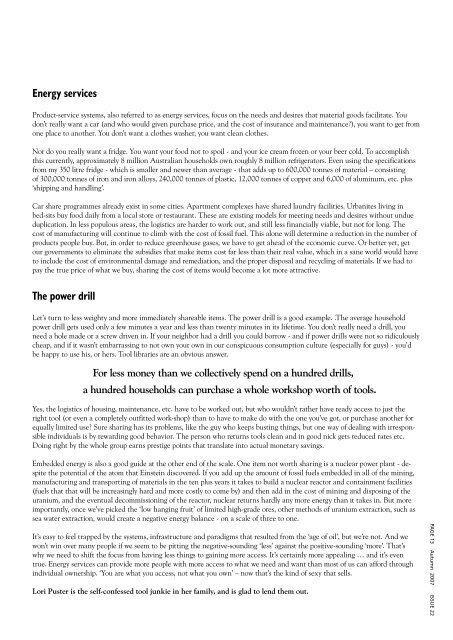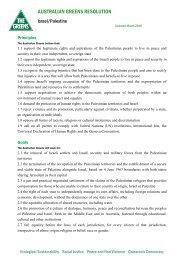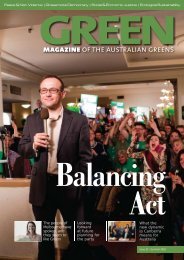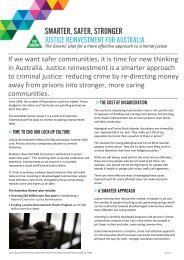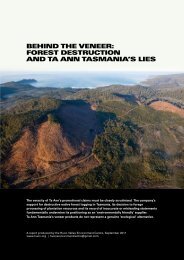news & views - Australian Greens
news & views - Australian Greens
news & views - Australian Greens
Create successful ePaper yourself
Turn your PDF publications into a flip-book with our unique Google optimized e-Paper software.
Energy services<br />
Product-service systems, also referred to as energy services, focus on the needs and desires that material goods facilitate. You<br />
don’t really want a car (and who would given purchase price, and the cost of insurance and maintenance?), you want to get from<br />
one place to another. You don’t want a clothes washer, you want clean clothes.<br />
Nor do you really want a fridge. You want your food not to spoil - and your ice cream frozen or your beer cold. To accomplish<br />
this currently, approximately 8 million <strong>Australian</strong> households own roughly 8 million refrigerators. Even using the specifications<br />
from my 350 litre fridge - which is smaller and newer than average - that adds up to 600,000 tonnes of material – consisting<br />
of 300,000 tonnes of iron and iron alloys, 240,000 tonnes of plastic, 12,000 tonnes of copper and 6,000 of aluminum, etc. plus<br />
‘shipping and handling’.<br />
Car share programmes already exist in some cities. Apartment complexes have shared laundry facilities. Urbanites living in<br />
bed-sits buy food daily from a local store or restaurant. These are existing models for meeting needs and desires without undue<br />
duplication. In less populous areas, the logistics are harder to work out, and still less financially viable, but not for long. The<br />
cost of manufacturing will continue to climb with the cost of fossil fuel. This alone will determine a reduction in the number of<br />
products people buy. But, in order to reduce greenhouse gases, we have to get ahead of the economic curve. Or better yet, get<br />
our governments to eliminate the subsidies that make items cost far less than their real value, which in a sane world would have<br />
to include the cost of environmental damage and remediation, and the proper disposal and recycling of materials. If we had to<br />
pay the true price of what we buy, sharing the cost of items would become a lot more attractive.<br />
The power drill<br />
Let’s turn to less weighty and more immediately shareable items. The power drill is a good example. .The average household<br />
power drill gets used only a few minutes a year and less than twenty minutes in its lifetime. You don’t really need a drill, you<br />
need a hole made or a screw driven in. If your neighbor had a drill you could borrow - and if power drills were not so ridiculously<br />
cheap, and if it wasn’t embarrassing to not own your own in our conspicuous consumption culture (especially for guys) - you’d<br />
be happy to use his, or hers. Tool libraries are an obvious answer.<br />
For less money than we collectively spend on a hundred drills,<br />
a hundred households can purchase a whole workshop worth of tools.<br />
Yes, the logistics of housing, maintenance, etc. have to be worked out, but who wouldn’t rather have ready access to just the<br />
right tool (or even a completely outfitted work-shop) than to have to make do with the one you’ve got, or purchase another for<br />
equally limited use? Sure sharing has its problems, like the guy who keeps busting things, but one way of dealing with irresponsible<br />
individuals is by rewarding good behavior. The person who returns tools clean and in good nick gets reduced rates etc.<br />
Doing right by the whole group earns prestige points that translate into actual monetary savings.<br />
Embedded energy is also a good guide at the other end of the scale. One item not worth sharing is a nuclear power plant - despite<br />
the potential of the atom that Einstein discovered. If you add up the amount of fossil fuels embedded in all of the mining,<br />
manufacturing and transporting of materials in the ten plus years it takes to build a nuclear reactor and containment facilities<br />
(fuels that that will be increasingly hard and more costly to come by) and then add in the cost of mining and disposing of the<br />
uranium, and the eventual decommissioning of the reactor, nuclear returns hardly any more energy than it takes in. But more<br />
importantly, once we’ve picked the ‘low hanging fruit’ of limited high-grade ores, other methods of uranium extraction, such as<br />
sea water extraction, would create a negative energy balance - on a scale of three to one.<br />
It’s easy to feel trapped by the systems, infrastructure and paradigms that resulted from the ‘age of oil’, but we’re not. And we<br />
won’t win over many people if we seem to be pitting the negative-sounding ‘less’ against the positive-sounding ‘more’. That’s<br />
why we need to shift the focus from having less things to gaining more access. It’s certainly more appealing … and it’s even<br />
true. Energy services can provide more people with more access to what we need and want than most of us can afford through<br />
individual ownership. ‘You are what you access, not what you own’ – now that’s the kind of sexy that sells.<br />
Lori Puster is the self-confessed tool junkie in her family, and is glad to lend them out.<br />
PAGE 13 Autumn 2007 ISSUE 22


